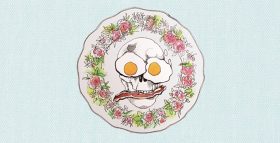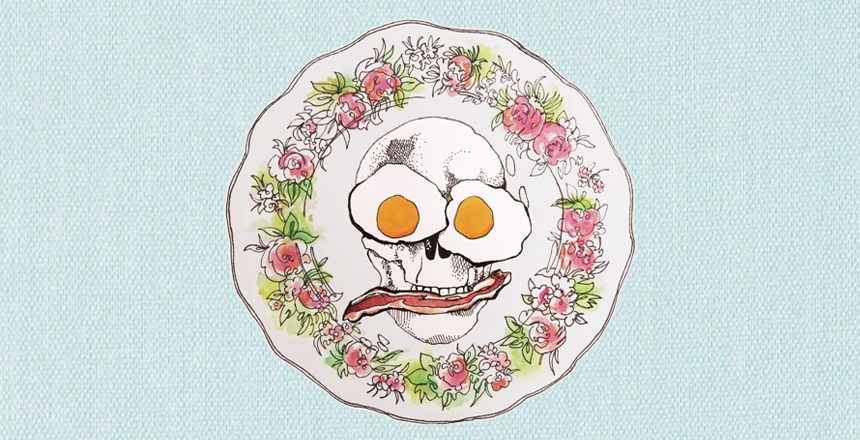My room was a mess when Juliana came in with muffins.
I was packing frantically, shoving clothes and books and mismatched shoes into a ratty black suitcase, intermittently stopping, standing, saying, “what the fuck?” to the empty room. Then Juliana and her muffins were there. She hugged me and I said “what the fuck?” into her chest.
I consumed two muffins without noticing in the frenzy of packing and phone calls and scrawling a note to my roommates on the whiteboard.
“Mom dying. Headed home. Food in the fridge up for grabs.”
Another friend and I finished off a six-pack of hard cider before we arrived at the airport. Going through security, a TSA agent asked me to take my shoes off. I looked him in the eye, ripped off a piece of my boarding pass and ate it. I have no idea why I did this, but he let me keep my shoes on.
Related
Finally on the plane, I assessed my situation. I was preparing for a five hour flight from New York to Los Angeles, with no way of knowing whether or not my mother would still be alive when I landed. The muffins settled in right along with the reality of my predicament. I could feel them, heavy and churning with the alcohol and the boarding pass in my stomach, and automatically I began calculating calories.
The boarding pass, I figured, was negligible. But how could I have let myself eat two whole muffins without thinking? Without even glancing at the nutrition information so helpfully and conveniently catalogued on the box? As we took off another thought came into my head.
“At least after she dies I’ll be too depressed to eat.”
Obviously that wasn’t the only thought churning around in my brain during that long, surreal plane ride. I’m wary admitting it even now. It’s so distasteful. In the middle of all this I was worrying about my waistline? Who the hell does that?
As it turns out, I do. Over the next year concerns about my weight loomed—became the framework through which I assessed the tangible manifestations of my grief. Weight loss, I told myself, meant I was “coping well;” weight gain meant I was “coping poorly.”
By my own metric, I coped extremely poorly, and ended up gaining over 25 pounds before I stopped counting. As hard as it is to admit, the pain that I felt examining my expanding thighs and softening belly was far more acute than anything I let myself feel for my mother. That’s kind of fucked up. Isn’t it?
Let’s all agree that, in the US at least, weight gain is explicitly and implicitly considered a personal failing, while weight loss is usually portrayed as “success,” especially for women. The assumption that thin-ness equals respectability, health and happiness is so ingrained that it takes a conscious effort to stop and question whether that’s actually true.
It is completely normal, maybe even healthy, to gain weight while you are grieving. It’s called “comfort food” for a reason. Yet every piece of advice out there, whether or not you’re in mourning, tells you how to avoid those extra pounds, or how to get rid of them if a traumatic experience should somehow compel you to you to *gasp* let yourself go.
There’s a wonderful German word for the pounds you put on while grieving: Kummerspeck. It translates roughly in English as “grief bacon.” This silly name is part of what makes it such an elegant concept. “Grief bacon” is both matter of fact and unpretentious. It reminds me that not only is the way my body reacts to grief normal, but also that the changes that have been imposed on my body and on my life since my mom’s death aren’t actually the end of the world.
In fact, I like “grief bacon” so much that I want to expand upon its meaning — I’ve started thinking of it as encompassing all the bodily baggage that comes along with loss. Loss is a deeply physical experience. It can leave us with both treasured keepsakes and houses full of crap to jettison. It affects the hormones our bodies produce. It affects our sleep cycles, our tear ducts, our appetites, our libidos. It affects who we love and how we love—the way we take care of ourselves and others .
.
In this series I hope to address the, well, fleshier aspects of grief. How does loss affect the way we live in our skin? How do dead bodies change the way we interact with living bodies? Is it appropriate to masturbate while you’re still in mourning, and if so, when can I start already?
These are questions worth wrestling with. Personally, all my grief bacon has forced me to begin making peace with my body in a way I don’t think I could have before my mom died. I can even eat muffins without feeling all weird and guilty about it. You wouldn’t believe how satisfying that is.
Ruby Dutcher is an intern for Modern Loss and a rising senior at Barnard College. She does not actually eat bacon, but has heard good things about it. Want us to cover your “Grief Bacon” in our series? Submit your brief pitch to [email protected].
Artwork by Emma Merkling.












